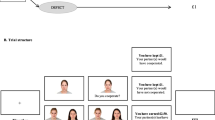Abstract
In two experiments female subjects performed a task either alone or while being observed by a female experimenter, after which they were told that they had performed well or poorly. On a paired-associates (PA) learning task that followed, subjects who performed in the presence of the observing experimenter required more trials to criterion and committed more errors than those who worked alone only if they had supposedly done poorly on the preceding task. Subjects who had done well on the prior task performed better on the PA task when observed than when alone provided that the preliminary task had also measured verbal learning. A measure of skin conductance indicated increased arousal under conditions of observation on the PA task only after a poor performance on the preceding task. The results are discussed in terms of the drive theory of social facilitation and the conditions under which being observed produces evaluation apprehension.
Similar content being viewed by others
References
Blank, T. O., Staff, I., & Shaver, P. Social facilitation of word associations: Further questions.Journal of Personality and Social Psychology 1976,34 725–733.
Border, R. J. Witnessed aggression: Influence of an observer's sex and values on aggressive responding.Journal of Personality and Social Psychology 1975,31 567–573.
Chapman, A. J. An electromyographic study of social facilitation: A test of the “mere presence” hypothesis.British Journal of Psychology 1974,65 123–128.
Clark, N., & Fouts, G. T. Effects of positive, neutral, and negative experiences with an audience on social facilitation in children.Perceptual and Motor Skills 1973,37 1008–1010.
Cottrell, N. B. Performance in the presence of other human beings: Mere presence, audience, and affiliation effects. In E. C. Simmel, R. A. Hoppe, & G. A. Milton (Eds.),Social facilitation and imitative behavior. Boston: Allyn & Bacon, 1968.
Cottrell, N. B. Social facilitation. In C. G. McClintock (Ed.),Experimental social psychology. New York: Holt, Rinehart & Winston, 1972.
Cottrell, N. B., Wack, D. L., Sekerak, G. J., & Rittle, R. H. Social facilitation of dominant responses by the presence of an audience and the mere presence of others.Journal of Personality and Social Psychology 1968,9 245–250.
Dua, J. K. Effect of audience on the acquisition and extinction of avoidance.British Journal of Social and Clinical Psychology 1977,16 207–212.
Geen, R. G. The role of social environment in the induction and reduction of anxiety. In C. D. Spielberger & I. G. Sarason (Eds.),Stress and anxiety (Vol. 3). Washington, D.C.: Hemisphere, 1976.
Geen, R. G. The effects of anticipation of positive and negative outcomes on audience anxiety.Journal of Consulting and Clinical Psychology 1977,45 715–716.
Geen, R. G. The influence of passive audiences on performance. In P. Paulus (Ed.),Psychology of group influence. Hillsdale, New Jersey: Erlbaum, 1979.
Geen, R. G., & Gange, J. J. Drive theory of social facilitation: Twelve years of theory and research.Psychological Bulletin 1977,84 1267–1278.
Good, K. J. Social facilitation: Effects of performance anticipation, evaluation, and response competition on free association.Journal of Personality and Social Psychology 1973,28 270–275.
Paulus, P. B., & Murdoch, P. Anticipated evaluation and audience presence in enhancement of dominant responses.Journal of Experimental Social Psychology 1971,7 290–291.
Rajecki, D. W., Ickes, W., Corcoran, C., & Lenerz, K. Social facilitation of human performance: Mere presence effects.Journal of Social Psychology 1977,102 297–310.
Rittle, R. H., & Bernard, N. Enhancement of response rate by the mere physical presence of the experimenter.Personality and Social Psychology Bulletin 1977,3 127–130.
Spence, K. W., Farber, I. E., & McFann, H. H. The relation of anxiety (drive) level to performance in competitional and noncompetitional paired-associates learning.Journal of Experimental Psychology 1956,52 296–305.
Steigleder, M. K., Weiss, R. F., Cramer, R. E., & Feinberg, R. A. Motivating and reinforcing functions of competitive behavior.Journal of Personality and Social Psychology 1978,36 1291–1301.
Weiss, R. F., & Miller, F. G. The drive theory of social facilitation.Psychological Review 1971,78 44–57.
Zajonc, R. B. Social facilitation.Science 1965,149 269–274.
Author information
Authors and Affiliations
Rights and permissions
About this article
Cite this article
Geen, R.G. Effects of being observed on learning following success and failure experiences. Motiv Emot 3, 355–371 (1979). https://doi.org/10.1007/BF00994050
Issue Date:
DOI: https://doi.org/10.1007/BF00994050




